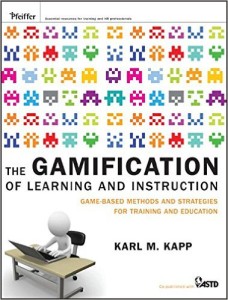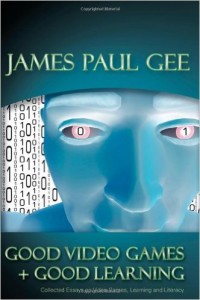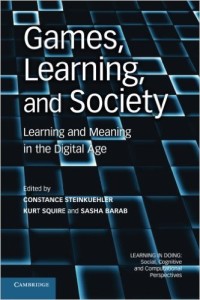7 Great Books on Games And Learning
Elisa teaches online professional development courses for teachers at teachertechtraining.com.
Register now for Teaching With Games - starts Monday January 4, 2016. Save $50 - Register by December 7, 2015!
Photo by Germán Póo-Caamaño
Looking to cut beyond the hype and dig in to what game based learning is all about? These seven books will give you a deep insight into ways games are being used today, and looks at the good – and the bad – of this growing phenomenon, including gamification.
1. The Gamification of Learning and Instruction: Game-based Methods and Strategies for Training and Education, by Karl M. Kapp
“Kapp introduces, defines, and describes the concept of gamification and then dissects several examples of games to determine the elements that provide the most positive results for the players. He explains why these elements are critical to the success of learning. The Gamification of Learning and Instruction is based on solid research and the author includes peer-reviewed results from dozens of studies that offer insights into why game-based thinking and mechanics makes for vigorous learning tools. Not all games or gamification efforts are the same, the gamification of learning and instruction requires matching instructional content with the right game mechanics and game thinking. Moving beyond the theoretical considerations, the author explores how to design and develop gamification efforts. Kapp discusses how to create a successful game design document and includes a model for managing the entire game and gamification design process.
The Gamification of Learning and Instruction provides learning professional with the help they need to put the power of game design to work.”

2. Video Games and Learning: Teaching and Participatory Culture in the Digital Age, by Kurt Squire
While Squire clearly wants to be an evangelist for game based learning, and wrote this book to convince educators of its power, he does not blindly exhort people to follow his teachings. He realistically outlines pros and cons of using games for teaching and makes it clear that there is more work to be done to further this field by suggesting future areas of research and development. This book is highly useful to any teacher who is enthusiastic about games and wants to incorporate them into the classroom, as well as anyone interested in designing educational games for use by teachers – especially those teachers who may not themselves be gamers. (Read my full review of this book.)

3. Games And Simulations in Online Learning: Research and Development Frameworks, by David Gibson (Ed.), Clark Aldrich (Ed.), Marc Prensky (Ed.)
“Nearly all early learning happens during play, and new technology has added video games to the list of ways children learn interaction and new concepts. Although video games are everywhere, on Web sites, in stores, streamed to the desktop, on television, they are absent from the classroom. Computer-based simulations, a form of computer games, have begun to appear, but they are not as wide-spread as email, discussion threads, and blogs. Games and Simulations in Online Learning: Research and Development Frameworks examines the potential of games and simulations in online learning, and how the future could look as developers learn to use the emerging capabilities of the Semantic Web. It presents a general understanding of how the Semantic Web will impact education and how games and simulations can evolve to become robust teaching resources.”

4. Digital Games and Learning: Research and Theory, by Nicola Whitton
“Digital Games and Learning: Research and Theory provides a clear and concise critical theoretical overview of the field of digital games and learning from a cross-disciplinary perspective. Taking into account research and theory from areas as varied as computer science, psychology, education, neuroscience, and game design, this book aims to synthesise work that is relevant to the study of games and learning. It focuses on four aspects of digital games: games as active learning environments, games as motivational tools, games as playgrounds, and games as learning technologies, and explores each of these areas in detail.”

5. Digital Game-Based Learning, by Marc Prensky
While this is a non-academic book that lacks a research focus, Prensky writes in a clear style and offers concrete examples of successful game based learning. Although Prensky himself falls prey to “hyping” the field, there are valuable nuggets in this book that make it a worthwhile read.
“Today’s workforce is quicker, sharper, more visually oriented, and more technology-savvy than ever. To truly benefit from the Digital Natives’ learning power and enthusiasm, traditional training methods must adapt to the way people learn today. Written by the founder of Games2train, this innovative book is filled with examples and information to meet the demands of both educators and employers.”

6. Good Video Games and Good Learning: Collected Essays on Video Games, Learning and Literacy, by James Paul Gee
“This book discusses a broad range of topics concerning video games, learning and literacy. These include the ways games can marry pleasure, learning and mastery through the sense of ownership, agency and control players enjoy when gaming, as well as controversial issues surrounding games. The book explores relationships between values, identity, content and learning, and focuses on how to understand and explain many young people’s differential experiences of learning in gaming and schooling respectively.”

7. Games, Learning, and Society: Learning and Meaning in the Digital Age, by Constance Steinkuehler (Ed.), Kurt Squire Ph.D. (Ed.), Sasha Barab Ph.D. (Ed.)
“This volume is the first reader on videogames and learning of its kind. Covering game design, game culture, and games as 21st century pedagogy, it demonstrates the depth and breadth of scholarship on games and learning to date. The chapters represent some of the most influential thinkers, designers, and writers in the emerging field of games and learning – including James Paul Gee, Soren Johnson, Eric Klopfer, Colleen Macklin, Thomas Malaby, Bonnie Nardi, David Sirlin, and others. Together, their work functions both as an excellent introduction to the field of games and learning and as a powerful argument for the use of games in formal and informal learning environments in a digital age.”

Elisa teaches online professional development courses for teachers at teachertechtraining.com.
Register now for Teaching With Games - starts Monday January 4, 2016. Save $50 - Register by December 7, 2015!





 A passion for creating educational multimedia, especially digital games. Fascinated by the challenge of integrating gameplay mechanics with educational content to create a true intrinsic learning experience. Interested in technology and special ed, digital storytelling, and science education. Closet science geek (shhh!!!)
A passion for creating educational multimedia, especially digital games. Fascinated by the challenge of integrating gameplay mechanics with educational content to create a true intrinsic learning experience. Interested in technology and special ed, digital storytelling, and science education. Closet science geek (shhh!!!)